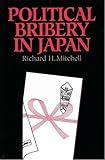Political Bribery in Japan / Richard H. Mitchell.
Material type: TextPublisher: Honolulu : University of Hawaii Press, [1996]Copyright date: ©1996Description: 1 online resource (224 p.)Content type:
TextPublisher: Honolulu : University of Hawaii Press, [1996]Copyright date: ©1996Description: 1 online resource (224 p.)Content type: - 9780824863968
- 364.1/323 20
- HV6321.J3 M57 1996eb
- online - DeGruyter
| Item type | Current library | Call number | URL | Status | Notes | Barcode | |
|---|---|---|---|---|---|---|---|
 eBook
eBook
|
Biblioteca "Angelicum" Pont. Univ. S.Tommaso d'Aquino Nuvola online | online - DeGruyter (Browse shelf(Opens below)) | Online access | Not for loan (Accesso limitato) | Accesso per gli utenti autorizzati / Access for authorized users | (dgr)9780824863968 |
Browsing Biblioteca "Angelicum" Pont. Univ. S.Tommaso d'Aquino shelves, Shelving location: Nuvola online Close shelf browser (Hides shelf browser)

|

|

|

|

|

|

|
||
| online - DeGruyter Personal Salvation and Filial Piety : Two Precious Scroll Narratives of Guanyin and Her Acolytes. | online - DeGruyter Philosophers of Nothingness : An Essay on the Kyoto School / | online - DeGruyter Pictures of the Heart : The Hyakunin Isshu in Word and Image / | online - DeGruyter Political Bribery in Japan / | online - DeGruyter Popular Literacy in Early Modern Japan / | online - DeGruyter Power by Design : Constitution-Making in Nationalist China / | online - DeGruyter Practical Pursuits : Religion, Politics, and Personal Cultivation in Nineteenth-Century Japan / |
Frontmatter -- Contents -- Acknowledgments -- A Note on the Transliteration of Japanese Words -- Introduction -- 1. Legacies -- 2. The New State -- 3. The Era of Party Government -- 4. Purifying Politics -- 5. Occupation Era -- 6. “New” Japan -- 7. Conclusion -- Appendix -- Notes -- Bibliography -- Index
restricted access online access with authorization star
http://purl.org/coar/access_right/c_16ec
Scholars often use the term "structural corruption" when discussing modern Japan's political system--a system that forces politicians to exchange favors with businessmen in return for funds to finance their political careers. Scholars argue that the origins of corruption can be found in the "iron triangles" formed by politicians, bureaucrats, and businessmen during the postwar era or during the Pacific War years. In this examination of malfeasance in Japanese public office, Richard Mitchell systematically surveys political bribery in Japan's historical and cultural contexts from antiquity to the early 1900s. Mitchell's narrative serially considers scandals involving courtiers in the ancient imperial government, corruption among the shogun's samurai officials, and political bribery among bureaucrats and party politicians in the mid-nineteenth century. Mitchell concludes that bribery was as ubiquitous in premodern Japan as it has been in recent times. Focusing on the period since 1868, Mitchell discusses in fascinating detail changes in political bribery in the wake of suffrage expansion, estimates of the enormous amount of campaign money needed to win a Diet seat in both the prewar and postwar periods, and the low conviction rate of suspected takers of bribes. Here is a highly readable and reliable survey of an important yet largely neglected topic in English-language studies of Japanese political history.
Mode of access: Internet via World Wide Web.
In English.
Description based on online resource; title from PDF title page (publisher's Web site, viewed 02. Mrz 2022)


